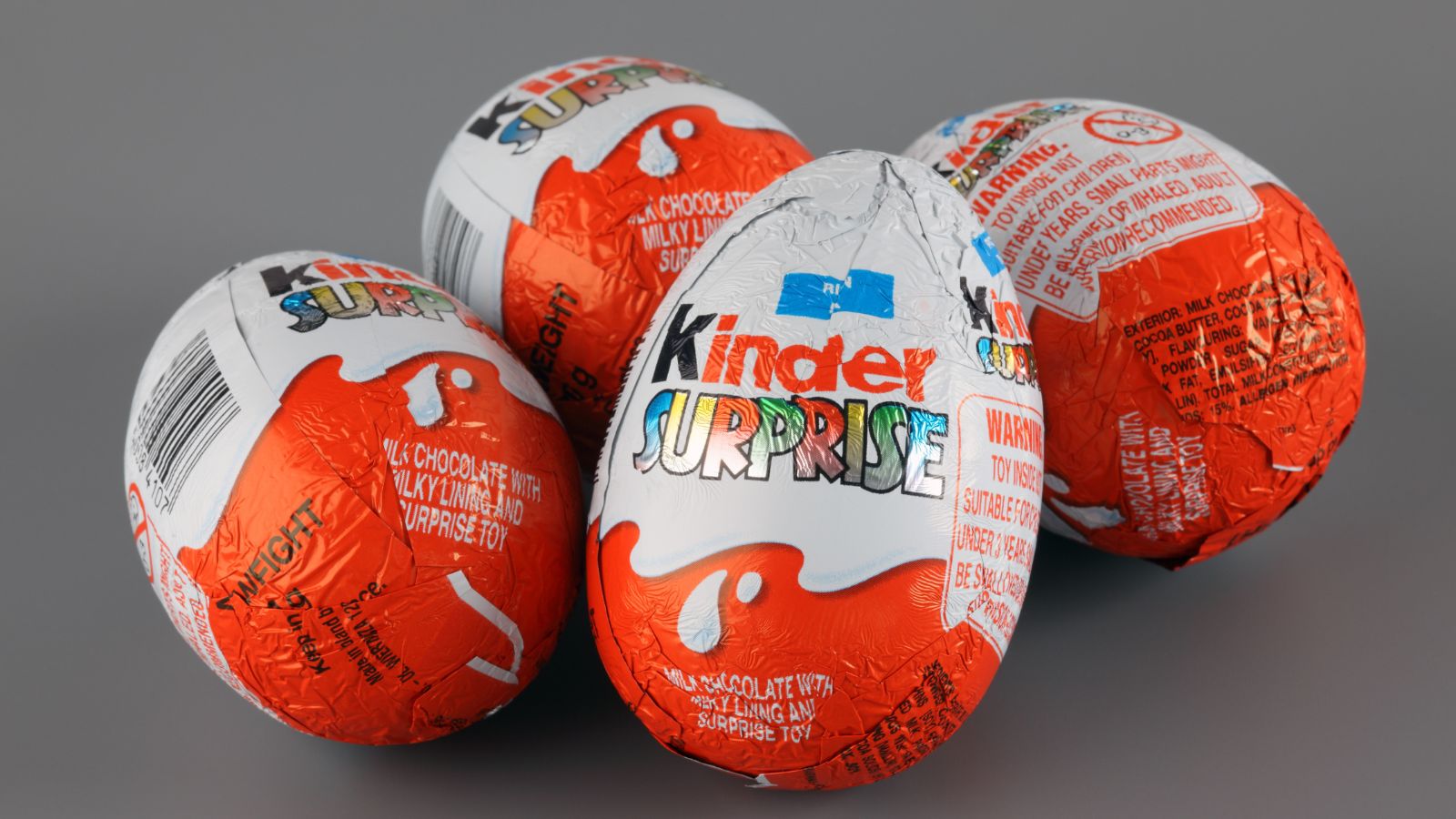The U.S. and Canada may share a 5,525-mile border and several cultural similarities, but there are plenty of differences between our two nations. When it comes to cuisine, specific food regulations that exist in the U.S. do not apply to popular food products available across the border. Here’s a look at 16 foods Canadians enjoy that are forbidden or restricted in America.
Kinder Surprise Eggs

These famous chocolate eggs made by Ferrero are aimed at children and contain a surprise toy inside, typically one with small plastic parts. Canadian parents can buy them, but the FDA has banned all candy, including non-nutritive objects that pose a choking hazard. According to Business Insider, the eggs have also been linked to a 2022 Salmonella outbreak.
Haggis

This savory, offal-based dish from Scotland is prevalent in some Canadian communities, but you won’t be able to try it south of the border. Traditional haggis is made with sheep organs (lungs, heart, and liver), minced with onions, oatmeal, and spices, then encased in a sheep’s stomach lining. However, the USDA restricts the importation of sheep lungs due to potential diseases.
Horse Meat

Horse meat consumption is legal in Canada, although it is heavily regulated. The U.S., however, has a long-standing cultural aversion to eating horses—maybe because of its ranching and cowboy heritage. The USDA has no inspection procedures for horse meat (for human consumption), so it’s effectively illegal to sell or process horse meat in North America.
Potato Spray Chips

Canadians love their ketchup, which has made several brands of ketchup-flavored potato chips popular there. Although U.S. citizens can find and enjoy this unusual flavor, the powdered flavoring used in the manufacture of the Canadian brand “Potato Spray” chips isn’t approved by the FDA. If you want this specific brand, you’ll have to do a border run!
Christmas Pudding with Beef Suet

Christmas pudding is a festive tradition in both countries, but the Canadian version often uses beef suet, a hard fat derived from cattle organs. The FDA considers suet an adulterant, defined by Science Direct as “cheaper, inferior, harmful, or unnecessary substance(s).” The FDA bans such ingredients, so U.S. puddings typically use butter or vegetable suet.
Pufferfish (Fugu)

This potentially deadly fish is a delicacy in Japan and some parts of Asia and can also be found in high-end Canadian restaurants under strict regulations. However, fugu contains a potent neurotoxin that can be fatal to humans if not prepared correctly by a licensed, highly trained chef. The FDA considers fugu too risky and forbids its importation and sale in the U.S.
Unpasteurized Kombucha

This fermented tea drink has grown in popularity in Canada in recent years because unpasteurized versions have similar benefits to probiotics. Unfortunately, its load of healthy bacteria poses a risk, as harmful microbes could also be present. The FDA requires that all kombucha on sale in the U.S. be pasteurized, effectively removing its probiotic qualities.
Marmite

This British savory spread made from concentrated yeast extract has an acquired taste but has a devoted following in Canada. However, Americans who want to try its strong, yeasty flavor will be disappointed. Marmite isn’t adequately labeled for food additives and folic acid fortification—a U.S. regulation for all spreads intended for human consumption.
BeaverTails Pastry

While not technically forbidden in the U.S. yet, these famous Canadian pasties are only available in eight locations and may soon be banned due to their unacceptably high saturated fat content. These treats are made from double deep-fried pastry dough stretched flat to resemble a beaver’s tail and served warm with sweet toppings like cinnamon sugar, maple syrup, or cream.
Head Cheese

Despite its name, this cold cut contains no dairy products and is a terrine-like product made from the head meat of calves or pigs, pressed into a loaf with aspic and sliced. Head cheese can be purchased in Canada, but MercoPress states that its greater risk of passing ‘mad cow disease’—a deadly prion disease—to humans has led to concerns. It is currently banned in the U.S.
Blood Sausage

Blood sausage (or black pudding) is a savory sausage made with pigs’ blood, grains, spices, and fillers. It’s a popular breakfast item in its country of origin (the UK) and is also enjoyed in Canada. However, the USDA restricts the use of blood in sausage casings due to food hygiene concerns, and imported products often fail to meet U.S. labeling requirements for blood content.
Moose Meat

Moose are plentiful in Canada, and their meat is considered a lean and healthy protein source. Hunting regulations aim to ensure sustainable populations, so properly butchered and inspected moose meat is regularly sold in Canada. The USDA, however, has stricter rules on farmed game meat, and moose meat is not currently approved for commercial sale.
Chickpea Flour

Also known as gram flour, this chickpea product is a staple ingredient in South Asian cuisine and is gaining popularity in Canada, particularly among gluten-free bakers. However, the FDA has stricter regulations on labeling due to the potential presence of allergens like mustard. Many U.S. consumers are, therefore, forced to use an alternative wheat-free flour.
Smarties

In Canada, the brand name ‘Smarties’ is the trading name for chocolates covered in a crisp, colorful shell. Although Canadian Smarties don’t contain any illegal ingredients and are appropriately labeled, they cannot be sold in the U.S. because the name has already been taken. You can still find Smarties in Canada, but they go by the name ‘Rockets.’
Cloudberries

These orange-colored berries offer a uniquely tart flavor and are found in Canada’s heavily forested regions. While many Canadians enjoy their sour taste, sometimes sweetened before serving, there are no reestablished regulations regarding their import or sale in the U.S. For this reason, they’re not yet legal to import and aren’t commercially available.
Caribou Meat

Like moose meat, caribou provides a lean source of protein that many Canadians find delicious. Although their populations are currently threatened, licensed hunting is permitted. According to the USDA, caribou meat for personal consumption can be brought across the border, but its commercial sale is forbidden due to concerns about chronic wasting disease, a prion disease affecting deer and elk.
Read More: People Who Had Unhappy Childhoods Usually Develop These 18 Traits

People who go through a lot of traumatic experiences while they’re young can find themselves developing traits that stay with them through adulthood. What are these traits? You’ll find 18 of them in this article.
People Who Had Unhappy Childhoods Usually Develop These 18 Traits
17 of the Most Dangerous Cities in the World (6 Are in The US)

Every city has its dangers, but it goes without saying that some places are far more dangerous than others. We’ve compiled a list of 17 of the most dangerous cities in the world in terms of violent crime and homicide rates.
17 of the Most Dangerous Cities in the World (6 Are in The US)
18 Reasons Why No One Is Interested in Working Anymore

The concept of traditional employment has taken a back seat in recent times with changes in economic and social factors, as well as individual preferences. Traditional jobs have also evolved, and many people don’t feel the need to take this route anymore. These are 18 reasons why no one is interested in working anymore.
18 Reasons Why No One Is Interested in Working Anymore
17 Most Friendly Wild Animals in the World

Are you an animal lover looking to learn more about the curious creatures that inhabit our planet alongside us? Discover the amicable side of the animal kingdom. Meet 17 of the world’s most sociable wild animals, from playful sea creatures to gentle land mammals.
17 Most Friendly Wild Animals in the World
17 Phrases Confident People Use to Stand Up For Themselves

Confidence is a healthy and attractive trait that helps us stand firm in our values and set healthy boundaries. We can always become more confident, and learning the right ways to stand up for yourself is a great way to start. Here are 17 phrases you can use to do so.
